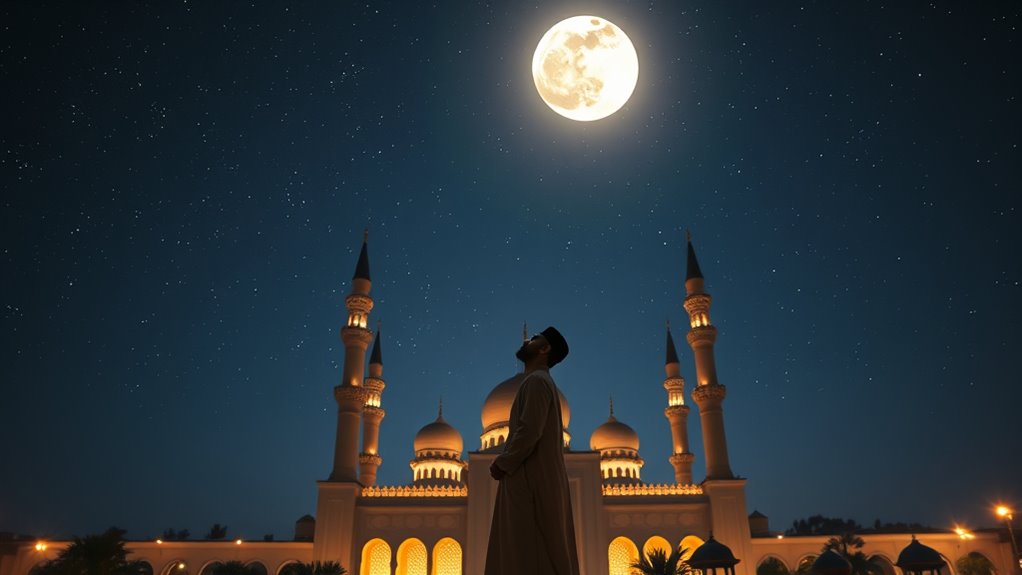In Islamic tradition, prophetic dreams are considered meaningful messages from Allah or His prophets that offer guidance, warnings, and insights through symbolic visions. They are viewed as more than just reflections of daily worries, carrying divine significance when approached with sincerity, prayer, and reflection. Recognizing symbols and their emotional context is key to understanding these dreams. If you continue exploring, you’ll discover how to interpret and apply these divine messages faithfully.
Key Takeaways
- Prophetic dreams are considered meaningful messages from Allah or prophets, holding divine significance beyond ordinary thoughts.
- Interpretation involves recognizing symbols rooted in Islamic teachings, requiring understanding of context and emotional state.
- Approaching prophetic dreams with sincerity, prayer, and reflection is essential; not all dreams are divinely inspired.
- Symbols like light or storm reflect guidance or turmoil, with emotional context helping clarify the message.
- Dream insights should be applied humbly through prayer, aiding in personal guidance and trust in divine wisdom.

Prophetic dreams hold a special place in Islamic tradition, serving as meaningful messages from Allah or guidance from the prophets. Many Muslims believe that these dreams are not mere reflections of daily thoughts but carry divine significance, often offering insights or warnings. If you experience a dream that feels profound or unusual, understanding how to interpret it can be essential. Dream interpretation in this context isn’t about casual guesswork; it involves recognizing prophetic symbolism—signs and symbols that carry specific meanings rooted in Islamic teachings. These symbols might include familiar objects, figures, or scenarios that have been linked to divine messages through centuries of tradition.
In Islamic teachings, the interpretation of prophetic dreams is considered a serious matter. The Prophet Muhammad (peace be upon him) emphasized that dreams can be a form of revelation, but only if they are from Allah. As you reflect on your dreams, you should remember that not all dreams are divine in origin; some may be rooted in your subconscious or everyday worries. Prophetic symbolism often appears in dreams as clear signs—such as seeing a bright light representing guidance or a storm symbolizing turmoil. Recognizing these symbols requires understanding the context and the emotional state during the dream. Islamic scholars have compiled collections of dream interpretations based on prophetic symbolism, which serve as valuable guides in discerning the messages behind the visions.
When encountering a prophetic dream, it’s advised that you approach it with sincerity and seek clarity through prayer and reflection. Many believe that Allah provides guidance in dreams to help you find the right path or warn you of upcoming challenges. To grasp the true meaning, you need to *deliberate* the dream’s details and how they relate to your life situation. Consulting knowledgeable individuals, like trusted scholars or those experienced in dream interpretation, can help you understand the symbolic language used in the dream. Remember, the goal isn’t just understanding the dream itself but also applying its message in your daily life with humility and faith.
Frequently Asked Questions
Can Anyone Have Prophetic Dreams in Islam?
Yes, you can have prophetic dreams in Islam. Islamic tradition suggests that anyone can experience them, especially if your sleep patterns are regular and peaceful. Dream symbolism plays a role, as signs and messages may appear in your dreams. To increase the likelihood, maintain sincerity, focus on prayer, and avoid disturbing your sleep. Remember, prophetic dreams are considered a special form of divine guidance, not guaranteed for everyone.
What Is the Difference Between Dreams and True Prophecies?
Dreams are like fleeting shadows, while true prophecies are like the dawn’s first light. You can distinguish them by their clarity and consistency with Islamic teachings. True prophecies often carry divine messages, confirmed through dream symbolism and proper dream interpretation techniques. Unlike ordinary dreams, they resonate deeply and align with Allah’s guidance, serving as a sign of divine insight, not just random images or feelings.
Are Prophetic Dreams Considered Divine Revelation in Islam?
Prophetic dreams are considered divine revelation in Islam, often containing meaningful dream symbolism that points to future events or spiritual insights. You should recognize that such dreams are special, but not all dreams hold divine meaning. When you experience a prophetic dream, reflect on its dream symbolism carefully, seek guidance from knowledgeable scholars, and trust that Allah may reveal important messages through these dreams, reinforcing your faith and understanding.
How Should One Interpret Confusing or Frightening Dreams?
Think of confusing or frightening dreams as storms in your mind’s sky—unsettling but passing. You should approach dream interpretation with patience and seek psychological insights to understand hidden fears or concerns. Don’t ignore these dreams; instead, reflect and pray for clarity. Consulting knowledgeable Islamic scholars or dream interpreters can help you find peace and guidance, turning turbulent dreams into meaningful messages for your spiritual growth.
Do Prophetic Dreams Have Specific Signs or Characteristics?
You might notice prophetic dreams often contain clear dream symbolism, such as specific symbols or messages that stand out. These dreams usually feel significant and leave a strong impression. To identify if a dream is prophetic, use dream interpretation techniques like reflecting on your feelings and the context. Pay attention to recurring themes or symbols, as they could be signs of guidance. Always trust your intuition and seek knowledge from trusted sources.
Conclusion
While some might doubt the significance of prophetic dreams, Islam teaches us they can be meaningful and spiritually revealing. You don’t need to see visions to strengthen your faith; understanding these dreams offers insight and guidance. Remember, not every dream is prophetic, but respecting their place in tradition can deepen your connection to your faith. Embrace your dreams with trust, knowing they can serve as a gentle reminder of divine presence and guidance in your life.









